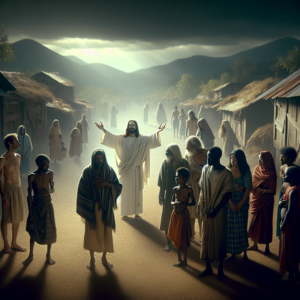Spiritual Devotional about Self-Realization
Awakening to Divine Truth: The Journey of Self-Realization
Greetings, Beloved! 🌟
Today, let’s embark on a divine exploration—the journey of Self-Realization. This sacred pilgrimage isn’t just about uncovering who we are; it’s about connecting deeply to the Divine presence within us, recognizing God’s hand in every facet of our lives, and ultimately, awakening to the profound truth that we are beautifully woven into the fabric of God’s eternal tapestry.
Biblical Foundations of Self-Realization
The Bible offers us abundant wisdom about understanding and realizing our true selves. One of the cornerstone scriptures that encapsulates this divine discovery is found in Psalm 139:14: "I praise You, for I am fearfully and wonderfully made; marvelous are Your works, and that my soul knows very well." This passage is a testament that we are divinely crafted and cherished by God. When we internalize this truth, we begin to grasp our inherent worth and divine purpose.
Another scripture that shines brightly in this regard is Ephesians 2:10: "For we are His workmanship, created in Christ Jesus for good works, which God prepared beforehand that we should walk in them." Recognizing ourselves as God’s handiwork opens our eyes to the truth that we are equipped for a divine mission, and understanding this prepares our hearts for a life of purpose and fulfillment.
The Journey Within
Self-Realization is, at its core, the pursuit of deeper communion with God—to see ourselves as He sees us. This journey often requires peeling back layers of fear, doubt, and worldly distractions. Jesus teaches us the power of seeking the Kingdom within in Luke 17:21: "The Kingdom of God is within you." Discovering the Kingdom within starts with recognizing that God’s Spirit dwells in us, guiding us towards our highest truths and our most authentic selves.
Steps to Self-Realization
-
Embrace Daily Communion with God: Spend dedicated time in prayer and meditation each day. As the Psalmist said in Psalm 46:10, “Be still, and know that I am God.” Quiet moments with the Divine reveal the innermost truths of our spirits.
-
Delve into Scripture: The Bible is a mirror reflecting divine truths. Let verses like Jeremiah 29:11, which promises God’s hope and future for you, saturate your heart with God’s unwavering love and purpose.
-
Self-Reflection and Journaling: Document your thoughts, prayers, and God’s revelations. Reflecting on your spiritual journey helps you to witness God’s transformative power over time.
-
Serve Others: Jesus exemplified that service is foundational to divine living. Engaging in acts of kindness and service, we align ourselves with God’s will and uncover the beauty of our purpose.
Encouragement from Within
Beloved, know that your journey of Self-Realization is a gradual, beautiful unfolding. Every step you take, each revelation you experience, draws you closer to the heart of God and to the realization of your grandeur as His creation. Allow the joys and even the challenges of this pilgrimage to fortify your spirit. Remember Paul’s encouragement in Philippians 1:6: "…He who began a good work in you will carry it on to completion until the day of Christ Jesus."
Be uplifted, knowing that within you is the essence of the Divine, the breath of the Eternal Father, and the guidance of the Holy Spirit. Your journey of Self-Realization is a testament to the glory of God, a fragrant offering of your life’s purpose coming to full bloom. Embrace this sacred path with joy, trust, and unwavering faith in the One who created you and calls you His own.
May your heart be filled with divine light and your spirit soar in the knowledge of your true self in Christ. Shine brilliantly, beloved, for you are a masterpiece in God’s grand design. 🌟
With boundless love and blessings,
[Your Name]
Explore and dig up answers yourself with our BGodInspired Bible Tools! Be careful – each interaction is like a new treasure hunt… you can get lost for hours 🙂
Q&A about Self-Realization
Sure, I’d be happy to create a Q&A based on the concept of Self-Realization.
Q: What is Self-Realization?
A: Self-Realization is the process of becoming fully aware of one’s true nature and potential. It involves a profound understanding of oneself on all levels—physical, emotional, mental, and spiritual. It is often described as a journey of discovering one’s true identity beyond the ego and material existence.
Q: How is Self-Realization different from self-awareness?
A: While self-awareness is the recognition of one’s emotions, thoughts, and behaviors in the present moment, Self-Realization goes deeper. It involves an understanding of the self beyond the superficial aspects of personality and ego. Self-Realization is more about understanding the essence or the true self, which is often described as eternal and unchanging, and aligning one’s life with this understanding.
Q: What are some paths to achieving Self-Realization?
A: Different spiritual traditions and philosophies offer various paths to Self-Realization. Some of the most well-known include:
- Meditation: A practice that helps calm the mind and allows individuals to connect with their inner self.
- Yoga: Beyond physical postures, yoga involves practices that lead to unity of the body, mind, and spirit.
- Mindfulness: Being fully present in the moment and observing thoughts and feelings without judgment.
- Philosophical Inquiry: Exploring existential questions and seeking answers beyond the material world.
- Service to Others: Engaging in selfless service can sometimes lead to insights about one’s true nature.
Q: What are the benefits of Self-Realization?
A: The benefits of Self-Realization are manifold and can include:
- Inner Peace: A deep sense of tranquility and contentment that goes beyond external circumstances.
- Clarity of Purpose: A clearer understanding of one’s life purpose and direction.
- Emotional Balance: Better management of emotions and a reduction in stress and anxiety.
- Authenticity: Living a life that is in true alignment with one’s values and inner self.
- Compassion and Empathy: A greater sense of connection with others and the world.
Q: Can Self-Realization be achieved suddenly, or is it a gradual process?
A: The journey to Self-Realization can vary greatly from one person to another. For some, it may occur as a sudden, transformative experience, often described as an awakening or enlightenment. For others, it is a gradual process of incremental insights and understanding gained over time through consistent practice and self-reflection.
Q: Are there any obstacles to achieving Self-Realization?
A: Common obstacles on the path to Self-Realization include:
- Ego: The identification with one’s false sense of self, including roles, achievements, and social status.
- Attachments: Clinging to material possessions, relationships, or beliefs.
- Fear: Fear of the unknown or fear of losing one’s current identity.
- Distractions: Being overly occupied with worldly pursuits and not dedicating time to inner growth.
- Lack of Guidance: Not having a clear path or a mentor to facilitate the journey.
Q: What are some practices or exercises that can help one move towards Self-Realization?
A: There are several practices that can assist in the journey towards Self-Realization, including:
- Mindfulness Meditation: Practice being present and observing thoughts and emotions without attachment.
- Journaling: Regularly writing down reflections and insights can help clarify inner experiences.
- Self-Inquiry: Asking oneself profound questions like "Who am I?" and seeking answers beyond superficial identities.
- Contemplation: Spending time in quiet contemplation on spiritual or philosophical texts.
- Breathwork: Techniques like pranayama can help control the mind and enhance inner awareness.
Self-Realization is a deeply personal and transformative journey, and the experiences and paths may vary greatly among individuals. It is important to approach it with openness, dedication, and a willingness to explore the depths of one’s being.


